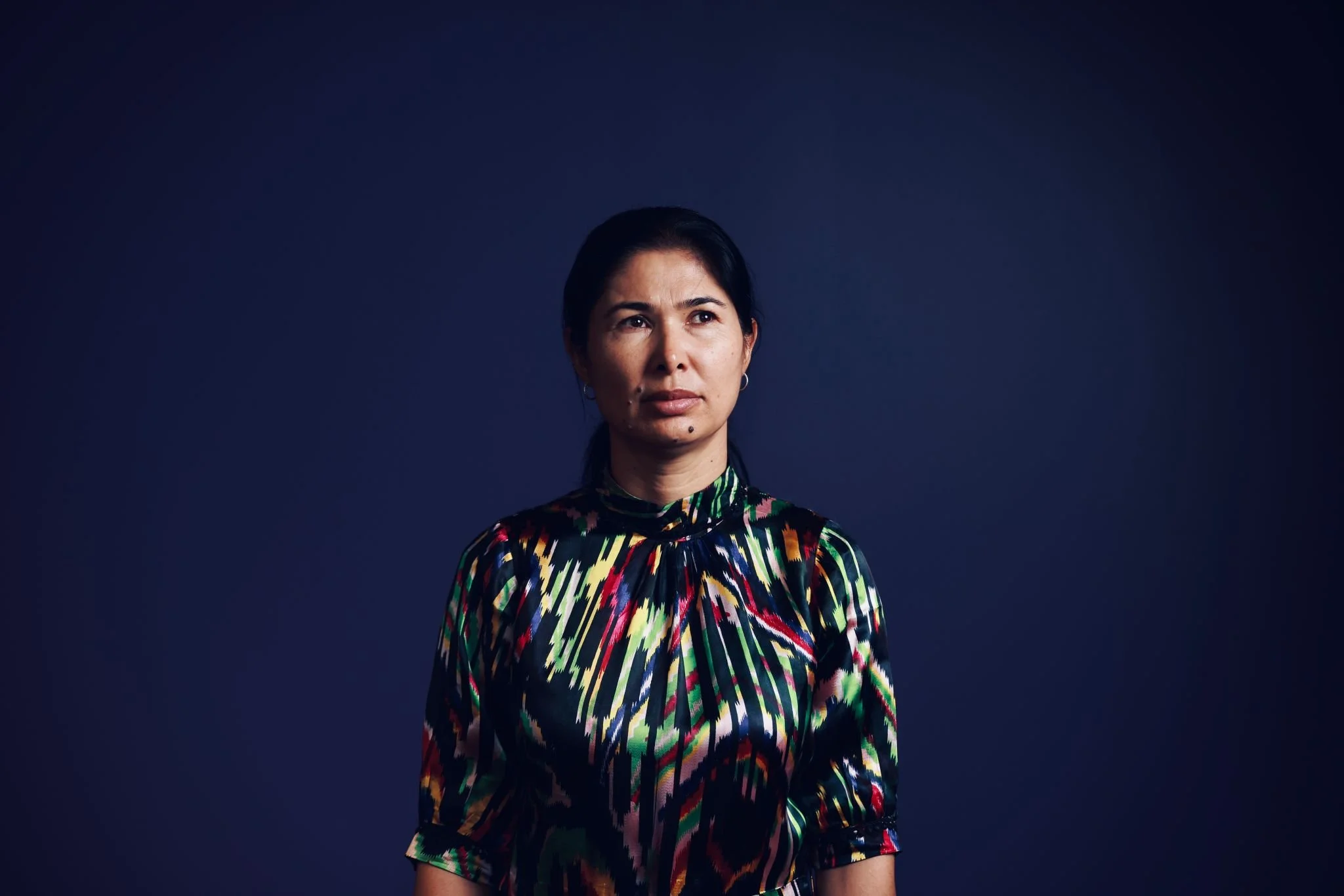Tursunay Ziyawudun
Tursunay is a survivor of the Chinese concentration camps.
She was born in a beautiful town in Kunes County, surrounded by mountains, lakes, and flowering trees. But at sixteen years old, China evicted Tursunay’s community to create a travel destination. Even now, she misses her hometown.
Tursunay married and moved to her husband’s home country of
Kazakhstan. In 2017, Tursunay’s visa expired, forcing her to return to China. When she arrived, she was arbitrarily imprisoned in a camp for “re-education”. After one month, Tursunay fell seriously ill. Her husband pressured camp officials until she was released.
Tursunay wanted to return to her home province of Kunes County, but it was no longer safe for Uyghur people; Many Uyghurs there were being sent to the camps. In an attempt to protect themselves, Tursunay and her husband moved to Huojia Count. ( Ghulja city ) .
However, even ( Ghulja city ) Huojia County was unsafe. The streets were filled with tanks and police. Cameras watched people everywhere. Neighbors received government calls sending them to the camps. Stores closed, the streets emptied, and people were afraid to stay out after 7:00pm. Some committed suicide rather than be taken to the camps.
Eventually, Tursunay got a call herself. In a strange act of normalcy, she tidied her house before leaving. She appeared at the government office the next day.
Upon arriving at the camp, Tursunay immediately saw that the camps had changed. Security was intensified, with an increase in guards and heavy metal doors at the camp entrance. Scores of men, women and children were unloaded from buses, and separated by gender and age. Guards pushed screaming children apart from their mothers. They forced everyone to remove their clothes and jewelry, yanking Tursunay’s earrings out of her ears when she fumbled. She watched old women cry in shame as their dresses were torn from them.
Tursunay was assigned to a cell with twenty other women. Instead of a bathroom, a bucket was passed around once a day, and each person had two minutes to use it. The cell had only two beds, so most of the women slept on the floor. Through the cell door, they could see more and more women being brought in. During her first few nights in the camp, Tursunay could hear a woman screaming, “Why have you locked me in here? I am a Khazak citizen!” After three nights, the woman’s screams stopped. Tursunay does not know what happened to her.
A few days after arriving, camp officials gathered all the female detainees outside, shaved off their hair, and placed it in bags. Tursunay remembers the women shrieking as their hair was cut. Soon after, the camp officials forcibly sterilized the female detainees by implanting IUDs (intrauterine devices) and administering antifertility drugs, to ensure that the Uyghur population would slowly diminish.
Life in the camp was a nightmare. Young girls were taken away in the middle of the night. Tursunay heard their screams echo throughout the camp, and heard camp guards shouting like animals. Sometimes the girls returned bruised and bleeding, with bite marks on their bodies. Sometimes they didn’t return at all.
One night, the guards came for Tursunay. For the next three nights, they strapped Tursunay to a tiger chair and interrogated her, asking: “Why did you go to Kazakhstan? Did you see anyone there? Did you participate in any illegal organizations?” The guards beat her, and eventually raped her. She repeated: “I didn't do anything, I didn't break any laws, I don’t know anything!” Nothing stopped the abuse.
After one year, Tursunay was suddenly released. She found out that her husband had returned to Kazakhstan, where he worked tirelessly to free her. He pressured the Chinese government, contacted international organizations, and testified. He created so much noise surrounding Tursunay’s imprisonment that eventually, the camp officials released her.
Tursunay still lives with trauma from the camp. She cries almost daily. She can no longer sleep at night, and when she does, she is plagued by nightmares. Nothing makes her happy anymore. She suffers from memory loss and forgetfulness. She is haunted by the thought of the millions of people who are still imprisoned in China.
Tursunay remembers the women in the camp that she left behind. She remembers a mother who had been taken to the camps while cooking dinner for her children. She spent months in the camp crying, not knowing what had happened to them. She remembers women wailing, “I don’t know why I’m here, I don’t know where my husband is, I don’t know where my children are.” When Tursunay left the camp, the other detainees implored her: Speak up for us. Speak up for those who are not so fortunate to have family outside of China, and who do not have anyone fighting for their release. Tursunay speaks because there are millions still imprisoned who may not survive. Tursunay believes China must answer for their human rights violations, and she seeks justice for the Uyghur people.
Tursunay is driven to share her testimony and relive the most painful years of her life in the hopes that she can be a voice for voiceless people, and that one day soon, they will be freed.

